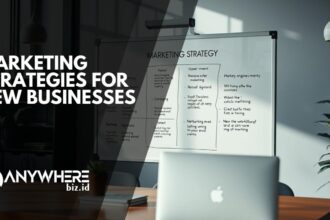Hello, Business Innovator! Welcome to ANYWHERE.BIZ.ID, your ultimate guide to starting an e-commerce business.
Are you ready to make your dream of starting an online business come true? What if you could turn your passion into a profitable e-commerce venture? This venture could make money even when you’re sleeping.
The digital marketplace offers amazing chances for entrepreneurs. You can build a successful online store from scratch. Starting an e-commerce business is not just a dream. It’s a real chance waiting for your unique vision.
In this guide, we’ll show you the seven bold steps to start your e-commerce journey. You’ll learn how to find a profitable niche and set up your online store. You’ll get practical tips to start your digital entrepreneurship journey.
The Must-Know Steps for E-Commerce Success
- Discover a proven roadmap for launching an e-commerce business
- Learn how to identify profitable market opportunities
- Understand the essential steps to build a successful online store
- Gain insights into digital marketing strategies for e-commerce
- Develop a strategic approach to online business growth
Key Insights into the E-Commerce Market
digital world is changing fast. Starting an online store is easier than ever. New tech and how people shop are opening doors for entrepreneurs.
Online sales are growing fast. This is changing how businesses meet customers. New trends are making online shopping better. It’s key for new stores to keep up.
Current Market Trends and Opportunities
Here are some big trends for online stores:
- More people are buying on their phones
- Shopping on social media is getting popular
- Stores are using AI to suggest products
- Customers want to shop online in a green way
Benefits of Running an Online Store
Starting an online store has many perks:
- It costs less to start than a physical store
- You can sell to people all over the world
- You can sell anytime, day or night
- It’s easy to manage your business online
Key Success Factors in E-Commerce
To do well online, focus on these:
- Make sure customers have a great time shopping
- Use smart marketing online
- Make choices based on data
- Be ready to change and adapt
“The future of retail is digital, and the time to start your e-commerce journey is now.” – Digital Commerce Expert
Starting an E-Commerce Business: Essential Foundation

Starting a successful e-commerce business needs careful planning. Your first steps are very important for your business’s future. They help decide how well your online store will do.
To grow and make money, you must focus on several key areas. These areas are important for your business to succeed:
- Comprehensive market research
- Robust business planning
- Legal business structure establishment
- Financial planning and budgeting
Understanding your market is key. You need to know who your customers are, what they like, and what they need. This helps you choose the right products and how to sell them.
“Success in e-commerce isn’t about luck—it’s about meticulous preparation and understanding your market.” – Digital Entrepreneurship Experts
Your business plan should have clear goals, financial plans, and a marketing strategy. Think of it as your guide through the e-commerce world.
Legal stuff is also very important. Pick a business structure that keeps your personal stuff safe and helps with taxes. You might choose:
- Sole proprietorship
- Limited Liability Company (LLC)
- S-Corporation
- Partnership
Each option has its own benefits. Talk to a lawyer to find the best one for your business. A strong start turns your online store into a lasting business.
Selecting Your Profitable Niche
Starting an e-commerce business starts with finding a special market spot. This spot makes you different from others. It can make your online business stand out and succeed.
Finding a profitable niche needs a smart plan and research. You want to find a place where you can offer great value and be unique.
Market Research Techniques
Good market research has several steps:
- Analyze online marketplaces like Amazon and eBay
- Study Google Trends for new interests
- Look at social media and hashtags
- Find out what people need but don’t have
Competition Analysis Strategies
Knowing your competition is key for an e-commerce business. Look at competitors with these important points:
| Metric | Assessment Criteria |
|---|---|
| Product Range | Breadth and uniqueness of offerings |
| Price Points | Pricing strategy and market positioning |
| Customer Reviews | Quality and quantity of positive feedback |
| Marketing Approach | Channels and messaging effectiveness |
Validating Product Ideas
Before fully starting your e-commerce business, check your ideas. Do this through:
- Targeted online surveys
- Small-scale product testing
- Getting feedback from possible customers
- Looking at early market reactions
Pro tip: Start small, test well, and be ready to change based on real feedback.
Building Your Brand Identity

Starting an e-commerce business means your brand is your digital card. It’s not just a logo or colors. It’s the feeling you share with people who might buy from you. A strong brand can turn casual visitors into true fans.
Your e-commerce brand should share a story that speaks to your audience. Think about these important parts of your brand:
- Create a memorable and meaningful business name
- Design a visually striking logo
- Develop a consistent visual language
- Craft a compelling brand narrative
To stand out, focus on what makes your brand unique. Authenticity is your greatest asset. People like brands that are real and open about their goals and values.
“Your brand is what other people say about you when you’re not in the room.” – Jeff Bezos
Really think about what your audience wants and needs. Your brand should talk to their dreams and solve their problems. When you get it right, your brand is more than a business. It’s a trusted friend in your customers’ lives.
Being consistent in how you look online is key. Your website and social media should all show your brand’s personality. This builds recognition and trust, which are key for e-commerce success.
Setting Up Your Online Store Platform

Starting an e-commerce business needs careful planning and the right tools. Your online store platform is key. It helps you run and grow your business smoothly.
Selecting the Perfect E-Commerce Platform
Choosing the right platform is very important. Each platform has special features for different needs.
- Shopify: Best for beginners with user-friendly interface
- WooCommerce: Ideal for WordPress users seeking customization
- BigCommerce: Robust solution for scaling businesses
Website Design Essentials
Your online store’s design affects how customers feel and buy. Make it clean and easy to use. This helps visitors find what they need quickly.
- Implement responsive mobile design
- Use high-quality product images
- Create clear navigation menus
- Ensure fast page loading speeds
Secure Payment Gateway Integration
Keeping customer financial info safe is very important. Choose payment gateways with strong security and many payment options.
| Payment Gateway | Transaction Fees | Security Rating |
|---|---|---|
| PayPal | 2.9% + $0.30 | High |
| Stripe | 2.7% + $0.30 | Very High |
| Square | 2.6% + $0.10 | High |
By picking the right platform, designing a great website, and adding secure payments, you’ll have a strong online business.
Creating Your Product Strategy
Starting an e-commerce business needs a strong product strategy. This plan helps you compete online. It guides how you find, price, and manage your products.
When starting, you’ll look at different ways to get products:
- Manufacturing your own products
- Wholesaling existing product lines
- Dropshipping from suppliers
- Utilizing print-on-demand services
Each method has its own benefits and problems. Your choice depends on your money, skills, and goals.
| Sourcing Method | Startup Costs | Profit Margin | Inventory Control |
|---|---|---|---|
| Manufacturing | High | Highest | Full Control |
| Wholesaling | Medium | Moderate | Partial Control |
| Dropshipping | Low | Lower | Minimal Control |
Pricing is also key in e-commerce. You need to price right to make money. Do your homework to know what to charge.
Managing your stock is vital. Use systems to keep the right amount without wasting money or running out.
Keep tweaking your strategy as you grow. Be ready to change based on what the market does.
Implementing Marketing and Sales Channels
Marketing is key for your e-commerce business to succeed. Good strategies can turn your online store into a bustling market. Knowing how to use different channels helps you find more customers and increase sales.
When starting your e-commerce, your marketing must be smart and wide-ranging. Each channel has its own way to reach your audience.
Social Media Marketing Strategies
Social media is a big help for e-commerce. Your plan should be to:
- Make engaging visual content
- Use special features of each platform
- Build real community connections
- Keep your brand message consistent
Email Marketing Campaigns
Email is a key part of digital marketing for e-commerce. Your campaigns should:
- Sort your audience well
- Make content and offers personal
- Write catchy subject lines
- Include clear call-to-action buttons
SEO Optimization Techniques
SEO is vital for being seen online. Important steps include:
- Find and use the right keywords
- Make high-quality, relevant content
- Optimize product descriptions
- Get quality backlinks
By using these marketing channels, you’ll have a strong plan. This plan will bring in more visitors, keep them engaged, and help your e-commerce business grow.
Managing Operations and Customer Service

Starting an e-commerce business means you must get good at running things smoothly. Your online store needs to work well behind the scenes and make customers happy.
Keeping track of your stock is key. Use strong tracking systems to:
- Watch stock levels as they change
- See when you might run out of something
- Order more stuff automatically
- Save money on storage
Getting orders out the door needs a plan. Make your shipping better by picking good partners and setting clear rules for packing. Think about using shipping software to cut down on work.
Being great at customer service sets you apart. Offer many ways for customers to reach you, like:
- Live chat support
- Fast email replies
- Helpful FAQs
- Quick answers
Make sure your business is easy to return to and solves problems fast. Train your team to be kind and quick with answers. This turns problems into chances to keep customers coming back.
“Great customer service is the heart of a successful online business” – Retail Experts
Focus on running things well and making customers happy. This will help you get more sales and good reviews in the busy world of e-commerce.
Turning Your Dream into Reality: The Final Step
Starting an e-commerce business is more than just a website. It’s about making a strong online presence that people love. We’ve shared key steps to help entrepreneurs start online.
Your success online depends on always learning and being ready to change. Every problem is a chance to get better and connect with customers more. ANYWHERE.BIZ.ID knows how hard it is to make an online store succeed.
Being an online entrepreneur takes a lot of work. Follow the seven steps we talked about. Keep an eye on your numbers, listen to what customers say, and be ready to change plans if needed.
FAQ
How much money do I need to start an e-commerce business?
Starting an e-commerce business can cost between $500 and $5,000. This depends on things like what products you sell, your website, and how you market. You can start small with a dropshipping model or a low-cost platform like Shopify Basic, which is just $29 a month.
What are the most profitable e-commerce niches in 2024?
Good niches include sustainable products, health items, tech accessories, and more. Look for areas with passionate customers and a chance to stand out.
Do I need technical skills to start an e-commerce business?
You don’t need to be a tech expert. Platforms like Shopify and WooCommerce are easy to use. Knowing some basics and being willing to learn is key.
How long does it take to launch an e-commerce store?
You can start a basic store in 1-2 weeks. A more detailed store might take 4-6 weeks. It depends on how ready you are and the complexity of your store.
What are the best marketing strategies for a new e-commerce business?
Good strategies include social media ads, content marketing, and email campaigns. Use Instagram and Facebook to show off your products. Building a strong online presence is important.
How do I handle shipping and fulfillment for my online store?
You can handle shipping yourself, use dropshipping, or services like Amazon FBA. Choose what works best for your business and customers.
What legal requirements are needed to start an e-commerce business?
You need to register your business and get licenses. Set up a bank account and follow tax laws. Also, make sure you have privacy policies and follow data protection rules. A lawyer can help with this.
How can I differentiate my e-commerce store from competitors?
Be unique by selling special products and providing great service. Create a strong brand story and focus on quality. Offer personalized experiences and unique packaging. Keep your prices competitive.
What payment methods should I offer in my online store?
Offer many payment options like cards, PayPal, and Apple Pay. Make sure your payment system is safe and easy to use.
How do I calculate pricing for my e-commerce products?
Consider the cost of your product, overhead, profit margin, and what others charge. Aim for a 30-50% profit margin. Use the formula: Product Cost + Overhead + Desired Profit = Selling Price. Always check what others charge and think about value.
Are you ready to make your e-commerce dreams come true? Start today. Use what you’ve learned to build a business that lasts and makes money. Your journey begins now. Get excited, face challenges, and watch your business grow!
Yay! 🎉 You made it to the end of the article!












